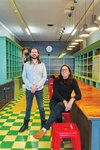
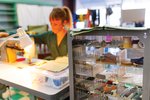
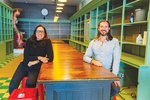


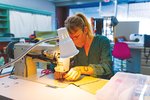
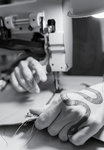

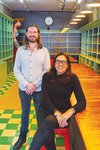
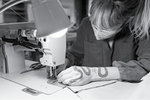
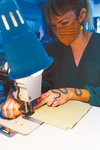
SILER CITY — Lisa Fedele is on a mission to infuse Siler City with new culture and economic stimulus — and it’s all starting with her downtown coworking space.
The Louisiana native moved to Chatham County eight years ago after taking a job at Cisco Systems Inc. in Research Triangle Park as a global creative operations lead. But corporate management is just a recent bullet point on her expansive résumé. The self-described “serial entrepreneur” has been a business consultant, restaurant owner and interior designer. She even worked as a strategic planner for the 13 museums and historical properties in the Louisiana State Museum system. Her many pursuits share a common theme, though — art and education.
“Much of my career was focused on working with organizations that have an educational mission,” Fedele said, “… fostering creativity and financial independence.”
She lives in Silk Hope and is still with Cisco, managing a global team of employers and contractors, but two years ago, she bought the Farmers Alliance building in downtown and created The Alliance, a coworking space, in the latest iteration of her life’s endeavor.
“I purchased the building because I couldn’t bear to see such an important building vacant,” Fedele said. “The Farmers Alliance has been the heart of downtown and it was important that it be maintained and honored.”
The corner building at 134 S. Chatham Ave. has been a fixture of Siler City almost since the town’s inception. The Farmers Alliance Cooperative Association opened its doors in 1888, one year after Siler City was founded, to “disseminate information regarding innovative agricultural practices,” Fedele said, “a forerunner to the state’s agricultural extension services.” It’s where farmers could buy staple items like seed and fertilizer in bulk at reduced prices. The Farmers Alliance operated continuously for 130 years, eventually transforming into a general store, before Fedele purchased the more than 4,000 square-foot space.
“When I was working on the building, I had so many people stop in and tell me stories about their childhood, buying peppermint stick candy with their grandfather, getting their first pair of boots at the Farmers Alliance, buying seeds to grow crops,” she said. “I knew that in owning this building, I had a responsibility to the past and an obligation to the future of Siler City. I kept the name, The Alliance, as an homage to the building’s past and the idea that an alliance is about joining together for mutual benefit or to achieve some common purpose.”
While the building’s primary function is different now, Fedele has worked hard to maintain its uniting effect.
“The Alliance was designed to be a hub, a safe space for everyone in our community to connect and collaborate,” she said. “Our mission is to foster creativity, critical thinking and innovation as a pathway for rural residents to advance their education, careers and ultimately build self-sustaining lives.”
The Siler City of Fedele’s vision would deviate a bit from its history. Big industry has always been the town’s backbone. But that’s a model prone to failure, she said.
“It’s been good that big industry has been here,” Fedele said, “but when they leave, a lot of people are disenfranchised.”
For many Siler City residents, the sting of Fedele’s assessment is fresh. At the height of the Great Recession, the town’s largest employers — Pilgrim’s Pride and Townsend, both poultry factories — closed their facilities. Nearly 1,400 lost their jobs.
Things started looking up for Siler City’s economy when Mountaire Farms opened at the former Townsend facility in 2019 and reintroduced poultry to the downtrodden market. But for Fedele, it wasn’t enough. Not everyone wants to work in poultry, or farming, or other traditional rural occupations, and Siler City doesn’t offer much variety.
“You should be able to live in this community,” Fedele said, “and your kids not have to leave to find the gainful employment they want.”
Her solution is to introduce more job opportunities from a variety of sectors. Fedele wants The Alliance to serve as a petri dish from which budding entrepreneurs can sprout before planting roots and maturing elsewhere in town.
“I believe there is so much knowledge in Chatham County hidden behind the trees,” she said. “We are working to bring these people together to share what they know with our community ... There is no excuse for rural brain-drain. We can teach skills that will allow people to live and work in Chatham, to spark entrepreneurship and create cottage industries that utilize the power of creative thinking.”
There is nothing wrong with big industry jobs, Fedele emphasizes. She thinks, for example, that Siler City’s heavy industrial CAM (the Chatham-Siler City Advanced Manufacturing) site will bring welcome opportunities for many underemployed workers in the area. But such employment shouldn’t be a town’s only option.
“This is not looking down on factory jobs,” she said, “but opportunity should be more than just what’s right in front of you.”
Fedele’s plan for transmogrification is hefty. To see it through, she has enlisted a number of Chatham organizations to partner with her as she nurtures a new swath of Siler City occupations. Her partners include Futures for Kids, Wildes Art Forum & Creativity Sparks, Chatham School of Science and Engineering & the Chatham Center for Innovation, Communities In Schools Chatham County, and the North Carolina Arts Incubator.
“There’s a symbiotic relationship between the Arts Incubator and The Alliance,” said Michael Feezor, the NCAI’s interim director.
Much like The Alliance, though more specific to artists, NCAI works to support developing businesses until they are fiscally capable of expanding elsewhere. Fedele serves on NCAI’s board as its education director. In their brief partnership, the two organizations have already worked together to secure $50,000 in grant money for local entrepreneurs and to launch a STEAM program for children, although their efforts were temporarily stifled when the pandemic struck.
“Our mission is to provide space that’s affordable so that people can try things,” Feezor said. “… We have had great experience incubating (artists) over 18 years and now we can leverage all that to reshape the town.”
Like Fedele, Feezor believes Siler City is the perfect site for cultural expansion and economic growth.
“A huge opportunity we have economically is two major highways that run through town, a train station that could become a major stop, presumably, and the airport,” he said. “There’s no reason new industries can’t locate here.”
‘I want to live here forever’
Fedele has a two-fold approach to achieving her goal: nurture creative entrepreneurship in Chatham youth, and provide young businesses a space in which to grow with minimal overhead. To each endeavor, she has devoted one half of her building.
“The building is divided in two,” Fedele said, “traditional coworking on one side and our programs on the other.”
On the right, as you enter the building, sprawling tables fill the open space, lined with cherry-red industrial stools. It’s where Fedele and her partners help “the next generation of creative entrepreneurs, innovators and artists by providing access to industry resources, events, mentorship, technology and knowledge sharing opportunities,” she said.
Especially since the pandemic began and in-person schooling stopped, The Alliance has helped Chatham groups like CISCC to keep students engaged and on track, providing a space in which educators can host in-person office hours and where students have access to strong internet connections.
“Lisa is good people, man,” said Tych Cowdin, CISCC executive director. “She is ready to make some things happen for typically underserved youth in the community.”
So far, CISCC has used the space to conduct parenting classes and to host open office hours and tutoring sessions for students who need in-person support. The open layout permits the organization to operate without violating social distancing recommendations.
“So, it’s just been a really great partnership, and I think this is just the beginning,” Cowdin said. “She has a wealth of networking resources for different program ideas … and I think students and families that are underserved would be great beneficiaries to the ideas and the programs that Lisa has in mind.”
Through a set of French doors, the program-center half of The Alliance gives way to a shared workspace where new businesses can incubate while avoiding the expense of a dedicated site. Unlike many coworking spaces designed for laptop-toting remote workers, though, The Alliance supports businesses like Julia Marina’s Milestone Bag Company.
“I live here more than my own home,” Marina said with a laugh.
Marina is a craftswoman. Nine years ago, in the throes of grief following her father’s death, she took up leather-work as a distraction from her pain.
“Little did I know that I would come to love working with leather in a way I’ve never loved anything,” she explains on her website, milestonebagco.com. “Almost a decade later and it is still my absolute favorite form of creativity.”
Since then, Marina’s product range has expanded to include wallets, belts and a line of 100% linen bespoke women’s wear. And, of course, every clothing purchase comes with a free handmade face mask.
As she works, her 3 year old, Theo, plays in The Alliance’s lounge area donning his favorite Batman costume. As a single parent, Marina is grateful to have found an accommodating environment.
“It’s been great,” she said. “Theo loves it here. He begs to come here on days when we’re not.”
Marina didn’t know much about Siler City when she moved into town a couple of years ago. “I fell in love with a guy,” she said by way of curt explanation. But the history and culture she found are what made her stay.
“I love community; I love small towns,” she said. “I love that it’s small enough to not get lost.”
She and Theo live in a tiny house now — a treehouse, in fact — just outside of town. But as her business grows and profits increase, she hopes to buy a local farmhouse to renovate and customize.
“I want to live here forever,” she said.
Milestone Bag Co. is prototypical of the company style Fedele wants to nurture. In a few years, Marina will likely achieve nationwide sales as per current projections. Her business will have grown large enough to hire apprentices and fill a larger space somewhere else in town, and Siler City would have added a new employment opportunity within a niche market.
“That’s what this is all about,” Fedele said. “This is not an approach with a larger agenda. It’s to build a community we can all live in. There’s plenty of space for all kinds of people.”
Reporter D. Lars Dolder can be reached at dldolder@chathamnr.com and on Twitter @dldolder.